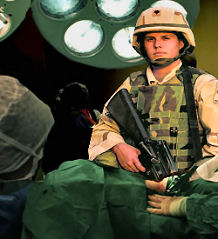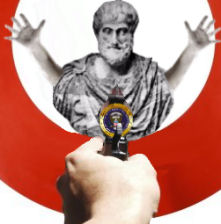Hold Still. This Is Good for You.
 Sunday, September 24, 2006 at 10:34AM
Sunday, September 24, 2006 at 10:34AM  Quote: “Surgical strikes? Nothing is surgical about military operations. They tend to have impacts, effects.” A “senior counterterrorism official” in the Washington Post.
Quote: “Surgical strikes? Nothing is surgical about military operations. They tend to have impacts, effects.” A “senior counterterrorism official” in the Washington Post.
Figure of Speech: horismus, the clear definition. From the Greek, meaning “definition.”
A classified report compiled by all 16 federal intelligence agencies and leaked to the press asserts that the war in Iraq is making us less safe from terrorism — not more safe, as the president contends. The anonymous Post source explains the reason with a horismus, a pithy definition that explains the distinction between terms.
Definition is one of the most powerful persuasive tools. Get your audience to believe your interpretation of the terms, and you have won half the rhetorical battle. Today’s quotation is a perfect example. If operations in Iraq are “surgical,” then it’s possible to kill the bad guys and bring freedom to the Middle East. But if you define military operations as messy, with unintended political affects, then killing the enemy will only create more enemies.
The White House will undoubtedly take the news seriously. Having failed to find Bin Laden, Bush’s men will begin a zealous hunt for the report’s leaker.
Snappy Answer: “So they’re cruel and bloody and create resentment throughout the population? That makes them more like an election.”






